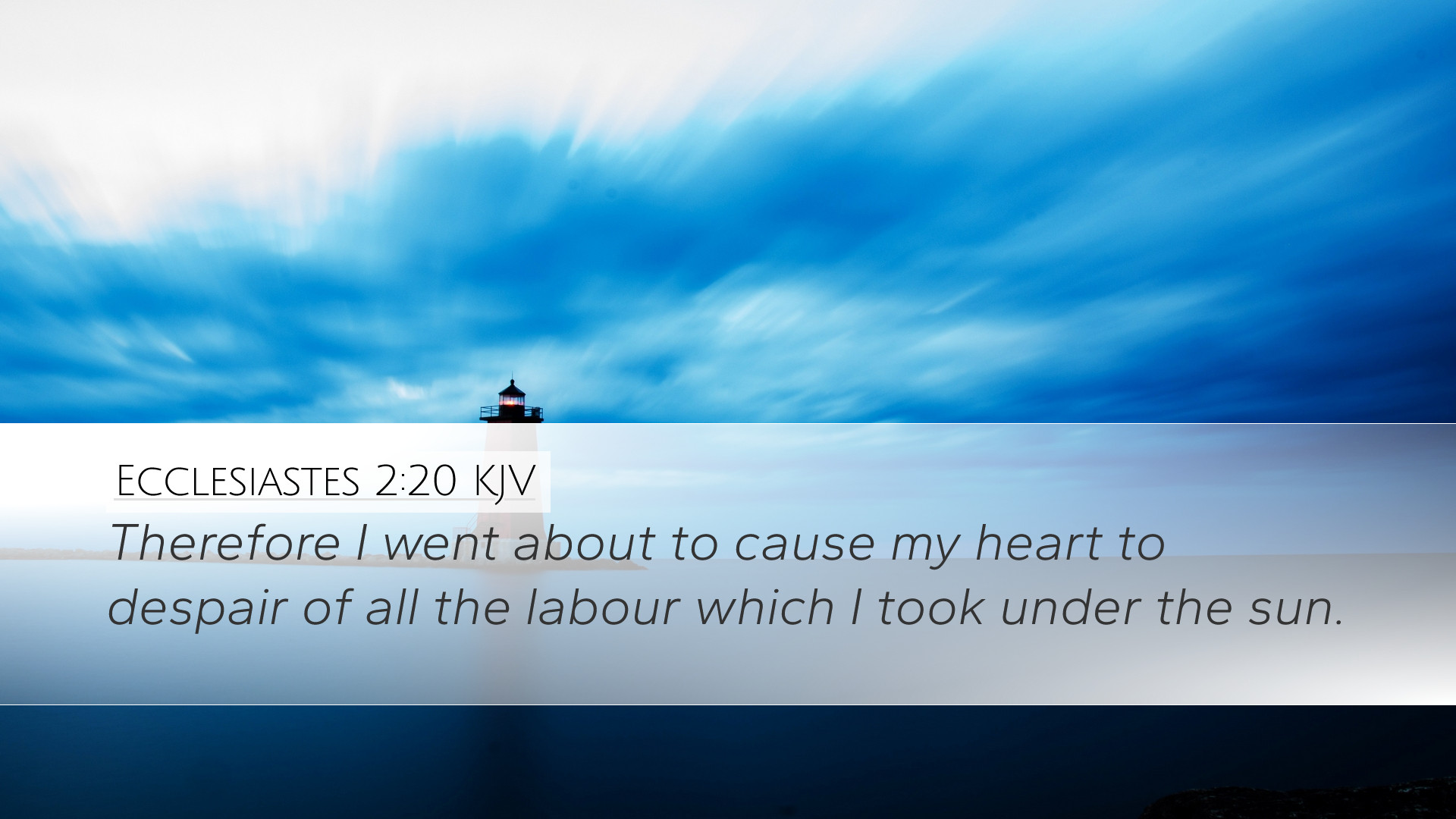Commentary on Ecclesiastes 2:20
Verse Reference: Ecclesiastes 2:20 - "Therefore I went about to cause my heart to despair of all the labour which I took under the sun."
Introduction
The Book of Ecclesiastes, traditionally attributed to King Solomon, contemplates the meaning of life in the face of mortality, futility, and the pursuit of pleasure. Ecclesiastes 2:20 serves as a poignant reflection on the emptiness that can accompany human endeavors. The commentaries by Matthew Henry, Albert Barnes, and Adam Clarke provide profound insights into the struggle depicted in this verse, illuminating its implications for the reader.
Contextual Analysis
The broader context of Ecclesiastes 2 presents a narrative where the Preacher (likely Solomon) engages in various pursuits—wisdom, pleasure, and toil—only to encounter the overarching theme of vanity. In verses preceding 2:20, Solomon describes the fruitlessness of his achievements and pleasures, ultimately leading to a disheartening conclusion regarding the pursuit of temporary satisfaction.
Matthew Henry's Insights
Henry observes a profound sense of despondency that permeates this verse. He writes that the Preacher, after extensive efforts in accumulating wealth and experiencing life's pleasures, concludes that such endeavors yield no lasting joy. Henry emphasizes that the heart's despair is a natural conclusion when one recognizes that material gain and worldly pursuits are temporary and often meaningless in the face of death.
- Despair of Labor: Henry explains that the despair is not merely about the labor itself, but about the futility of labor that cannot satisfy the heart’s deepest desires. He notes, "Man is not able to find satisfaction in his work, especially when he considers that he must leave it to those who come after him."
- The Inevitability of Death: Henry highlights that the inevitability of death renders all earthly labors void of eternal significance, leading to a sense of hopelessness when viewed under the sun.
- Divine Perspective: He urges the reader to adopt a perspective that transcends earthly concerns, focusing instead on spiritual and eternal matters.
Albert Barnes' Reflections
Barnes elaborates on the emotional state of the Preacher, pointing out that the trials of life can lead one to a profound sense of futility. He notes that this despair reflects a recognition of the vanity of earthly pursuits.
- The Nature of Labor: Barnes emphasizes that hard work and diligence are not inherently worthless; rather, the way they are viewed in light of eternity makes all the difference. "Man’s labor, though it may be to his advantage, cannot produce what he ultimately seeks," he states.
- Temporal vs. Eternal: He advocates for a shift in focus from transient gains to eternal values, encouraging readers to consider the lasting impact of their actions beyond this life.
- Emotional Realism: Barnes also acknowledges the emotional turmoil that can arise from such realizations, asserting that despair can be an initial response to recognizing life's inherent limitations.
Adam Clarke's Commentary
Clarke offers a broader philosophical interpretation of the Preacher’s melancholy. He articulates the universal human condition where individuals often toil for things that do not ultimately bring fulfillment.
- Human Endeavor: Clarke writes, "The human heart is often burdened with the pursuit of labor that lacks promise," highlighting the existential plight that humanity faces.
- The Role of Fate: He suggests that one’s efforts may seem futile when considered against the backdrop of fate and the unpredictable nature of life, leading to existential despair.
- Hope Beyond Despair: Clarke encourages readers to find hope amidst despair by identifying true purpose and meaning found in spiritual pursuits rather than mere earthly endeavors.
Theological Implications
This verse invites deep theological reflection. The despair articulated by the Preacher beckons believers to confront the often uncomfortable reality of human existence. It serves as an invitation to reevaluate our pursuits and possibly redirect them towards what is eternal.
Coping with Despair
For pastors, students, and scholars, this text offers rich material for counseling and teaching contexts. Understanding that despair can arise from the pursuit of worldly gains can prompt discussions on the importance of transcending earthly concerns through faith.
Existential Questions
This verse encourages believers to grapple with significant existential questions: What is the meaning of life? What will remain when all is said and done? The insights from these commentaries guide us towards answers that lie in the realms of faith, community, and connection with God.
Conclusion
Ecclesiastes 2:20 is an invitation to reflect on the nature of our work and the ultimate purpose behind it. Through the wisdom of Matthew Henry, Albert Barnes, and Adam Clarke, we see a pathway from despair to hope, urging us to reassess our foundations and find meaning not just in labor, but in a relationship with the Divine. As we ponder these insights, may we embrace the eternal significance of our pursuits and strive for a life that honors both our labor and our Maker.


